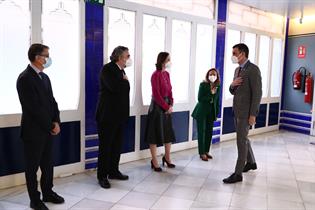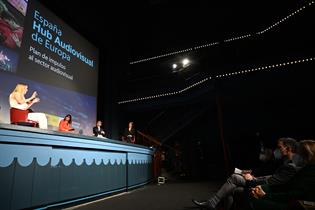Plan to boost the audio-visual sector
Pedro Sánchez presents 'Spain, Audio-visual Hub of Europe' plan, with over 1.6 billion euros of public investment to 2025
President's News - 2021.3.24
Doré Cinema, Madrid
The plan includes 1.6 billion euros of public investment for the period 2021-2025 and its aim is to increase audio-visual production in Spain by 30% by the end of that period.
During the event to present this plan, Pedro Sánchez said that "the audio-visual industry carries great weight in terms of jobs and the economy, but also in terms of our cultural identities and international profile".
The President of the Government explained that, at a time when the Spanish audio-visual industry is enjoying extraordinary recognition around the world, "a sustainable, richer and more fruitful ecosystem capable of the growth deserved by the immense talent to be found in our industry should be built". Pedro Sánchez went on to add that "we need the model to be sustainable if we want to realise that new ecosystem. It must be profitable, capable of being self-sufficient and grow as a source of wealth. We are going to find that common ground between the expressive vocation of our creators and the conversion of that into competitive and profitable industrial products".
 Pool Moncloa/Fernando CalvoThe presentation event for 'Spain, Audio-visual Hub of Europe' was also attended by the Third Vice-President of the Government and Minister for Economic Affairs and Digital Transformation, Nadia Calviño, the Minister for Industry, Trade and Tourism, Reyes Maroto, and the Minister for Culture and Sport, José Manuel Rodríguez Uribes. The President of the Animation and Audio-visual Effects Federation (DIBOOS), Nicolás Matji, the former US Ambassador to Spain, James Costos, and the film director, Isabel Coixet, also attended the event via video link.
Pool Moncloa/Fernando CalvoThe presentation event for 'Spain, Audio-visual Hub of Europe' was also attended by the Third Vice-President of the Government and Minister for Economic Affairs and Digital Transformation, Nadia Calviño, the Minister for Industry, Trade and Tourism, Reyes Maroto, and the Minister for Culture and Sport, José Manuel Rodríguez Uribes. The President of the Animation and Audio-visual Effects Federation (DIBOOS), Nicolás Matji, the former US Ambassador to Spain, James Costos, and the film director, Isabel Coixet, also attended the event via video link.
A round table discussion took place during the event involving the film producer, Belén Atienza, the President of the Academy of Cinematographic Arts and Sciences, Mariano Barroso, the video game developer, Valeria Castro, and the President of the Spanish On-Demand Video Association, José Antonio Luna.
Promotion of the audio-visual industry value chain
The plan includes public investments and reforms aimed at giving a significant boost to the entire value chain in the audio-visual industry based on the strengths to be found in Spain, such as a financially stable audio-visual industry, well-trained and prestigious professionals, globally recognised creative capacity and a comparative advantage in the growing global market for audio-visual production in Spanish.
The plan is based on a comprehensive overview of the audio-visual sector in all its formats (cinema, TV series, short films, advertising, video games and animation) and an inclusive vision that transcends audio-visual factors to link up with culture, tourism and the image of Spain itself.
The measures included in 'Spain, Audio-visual Hub of Europe' are focused on four cornerstones supported by three priorities: to convert Spain into a magnet for audio-visual production by reducing the administrative and regulatory costs associated with this activity; to improve the competitiveness of companies through the application of new technologies that enable them to compete in a digitalised market; and to create talent by reducing the gender gap.
First cornerstone: to digitalise, internationalise and attract investment
The first cornerstone of this plan, with a scheduled investment of 240 million euros, includes actions aimed at digitalising both audio-visual production and audience tracking in order to foster the launch and improvement of platforms engaged in Spanish audio-visual production and its distribution, encouraging its international commercialisation, especially for those projects that build partnership ecosystems between SMEs.
Furthermore, a single information point and a centralised point of contact will be created - the 'Spain Audio-visual Hub Bureau', which will provide information, assistance and accompaniment to potential investors in the sector, both foreign companies wishing to invest in Spain and Spanish companies interested in the internationalisation of their business. This cornerstone will include the development of an audio-visual sector internationalisation programme developed by the Ministry of Culture and Sport and ICEX Spain Exports and Investments, and a programme to attract filming and foreign investment in Spain.
Improvements to tax and financial instruments
 Pool Moncloa/Borja Puig de la BellacasaThe second cornerstone includes two types of measures: those aimed at facilitating access to financing; and those focused on the application of tax incentives for audio-visual production in Spain. 1.33 billion euros will be invested in this up to 2025.
Pool Moncloa/Borja Puig de la BellacasaThe second cornerstone includes two types of measures: those aimed at facilitating access to financing; and those focused on the application of tax incentives for audio-visual production in Spain. 1.33 billion euros will be invested in this up to 2025.
The type of projects eligible to receive financing from the Official Credit Institute (Spanish acronym: ICO) is broadened. The projects subject to receiving financing from the Spanish State Innovation Company (Spanish acronym: ENISA) are increased to include innovative projects in the field of animation, video games and visual effects. The two entities will strengthen their existing lines of credit to the sector and will create new lines aimed at encouraging digitalisation and fostering a reduced gender gap.
In terms of tax incentives, the Spanish tax framework for these activities was amended during the course of 2020 with the approval of Spanish Royal Decree-Law 17/2020, Spanish Royal Decree-Law 34/2020 and Spanish Law 11/2020, of 30 December, approving the National Budget for 2021. With this regulatory framework now approved, measures are being put in place to facilitate its application and oversight, granting increased certainty and foreseeability to investors.
This cornerstone also includes facilities for accessing bank finance and the strengthening of financial instruments that support internationalisation through the Spanish Company for Export Insurance Credit (Spanish acronym: CESCE), COFIDES and ICO.
Availability of talent and development of human capital
The goal of this cornerstone is to adapt training plans to the skills needed by the industry and to support the training offered by companies to their employees. In partnership with the Ministry of Education and Vocational Training and the Ministry of Industry, Tourism and Trade, a training programme will be launched for employment in the digital economy.
Furthermore, institutional support will be provided for the creation and communication of training programmes launched by companies in the audio-visual sector. This cornerstone is supplemented by measures included in the National Digital Skills Plan (presented in January), which dedicates a specific area to access by women to training and qualifications in the audio-visual sector. 15 million euros of investment will be allocated to this.
Regulatory reforms and the elimination of administrative barriers
The fourth cornerstone has a budget of 18 million euros and is targeted at reforms leading to improved regulation and the elimination of administrative barriers. The reforms considered under the plan include a General Audio-visual Communication bill and a Cinemas bill. This cornerstone also includes the simplification and reduction of administrative burdens within the immigration system on grounds of economic interest and the creation of an online point of contact for visas and/or residency and work permits related to audio-visual projects at consulates.
Finally, and in order to suitably track the measures implemented under this plan, a report on the audio-visual sector will be drafted annually and will include a description of the various subsectors (cinema, TV series, animation, video games, e-Sports, cinema advertising, visual effects, etc.), their evolution and growth perspectives.
Non official translation





